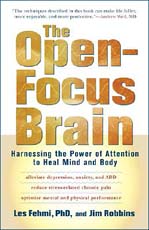"If you are like most people these days, Gandhi's warning ["There is more to life than increasing its speed"] has probably gone unheeded and the speed of life seems to be increasing exponentially. Many clients tell me they rush through the day — dropping the kids off at school, zipping off to work on jam-packed freeways, frantically playing out in their heads the things they need to do, obsessing over the details of work or school, juggling cell-phone calls as they drive — anxious to cram as much as they can into their lives lest they miss something.
"But many people also tell me that even when they stop rushing about, they can't wind down. They complain of not being able to fall asleep or of feeling edgy, irritable, anxious, depressed, restless, impatient, dissatisfied, or bored — or all of the above. They can't relax unless they have a drink or two. During the day they have trouble mustering the energy to focus and pay attention, and so they power up with double espressos. They have headaches, backaches, and a long list of other chronic physical problems. Thoughts race through their heads. And many people say they feel they are merely skimming the surface of what goes on around them, missing out on the deeper feelings of life's experiences.
"These kinds of problems are epidemic. But in most cases there is nothing wrong with the people who suffer them; nor is anything necessarily wrong with their lives. Instead it is a matter of 'operator error.' Everyone has the ability to rebalance and heal their nervous systems to end these problems, to dissolve their pain, to slow down and yet accomplish more, to experience life more deeply, to optimize the function of their bodies and minds, to dramatically change their lives for the better. They just don't know how.
"The answer is simple and well within their grasp — it is accomplished by changing the way they pay attention.
"When I ask someone how they pay attention, they usually scratch their head and wonder what I mean. Most people assume they are paying attention or not, end of story. There exists little vocabulary to describe, and scant physiology to understand, how we pay attention. At first glance the subject, quite honestly, seems dull.
"For more than forty years, however, I have been a student of how human beings attend both to the world around them and to their internal world of emotions and thoughts. Pry beneath the surface of the subject of attention, and there is a fascinating and fundamental phenomenon that has intrigued holy men, psychologists, military researchers, and advertising executives for many years. And for good reason: attention is the central mechanism through which we guide our awareness and experience the world.
"The term 'paying attention' is an apt one, for too often it is more costly than we realize. Failing to deploy our attention appropriately can cost us dearly by contributing to a host of physiological and emotional problems and keeping us from reaching our full potential. The truth is that most of us go through life paying attention the wrong way.
"For the past thirty years people have come to our workshops and to our clinic, the Princeton Biofeedback Center, in Princeton, New Jersey, to learn one thing: how to change the way they pay attention. Without drugs or other medical interventions, people from all walks of life learn to reduce stress; dissolve chronic pain; stop anxiety; alleviate depression; ease fears, shame, envy, anger, and loneliness; and overcome attention deficit disorder (ADD), attention-deficit/hyperactivity disorder (ADHD), and other cognitive problems. The world-class executives, athletes, artists, and performers I've worked with have learned to dramatically improve their performance. And other health professionals have come to learn to apply the lessons of attention to everything from psychotherapy to massage.
"The changes that come from learning to pay attention in different ways aren't subtle — they have robust effects on the entire nervous system, from our eyes to our muscles to our mind, body, and spirit."
